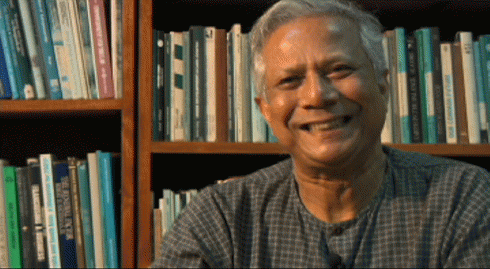On April 17, Muhammad Yunus will be honored by Congress, becoming one of only seven people to ever achieve the trifecta: the Nobel Prize, the Presidential Medal of Honor and the Congressional Gold Medal. My guest today is Holly Mosher, award-winning filmmaker, director and producer of Bonsai People: The Vision of Muhammad Yunus.
JB: Welcome to OpEdNews, Holly. What initially got you interested in this subject?
HM: I had never heard of Muhammad Yunus or microcredit before I read the New York Times article announcing that he and the Grameen Bank had won the Nobel Peace Prize. There were two points in the article that just floored me: one, that he was helping 6.5 million women in Bangladesh, which I quickly realized was one out of every 1,000 people on earth, and two, that a banker and an economist had gotten the peace prize instead of the prize for economics. After reading that, I knew immediately that I had to go to Bangladesh and explore the possibilities for a film. I love seeing people make a positive difference in the world, and this seemed that it may be the biggest scope of positive impact I may ever see.
JB: Why did he receive the peace prize as opposed to the prize for economics?
HM: I think the person who puts it best is Mahatma Gandhi when he said, "Poverty is the worst form of violence." I think the Nobel Committee has seen the impact that Muhammad Yunus's work has had on lifting people out of poverty. When you look at the Grameen Bank's index of poverty , they find that through the bank, over 50% rise above their level of poverty within 5-6 years. And one thing that made an impact on me is what Yunus said in his Nobel Peace Prize speech:
"By giving us this prize, the Norwegian Nobel Committee has given important support to the proposition that peace is inextricably linked to poverty. Poverty is a threat to peace.
The world's income distribution gives a very telling story. 94% percent of the world income goes to 40% of the population while 60% of people live on only 6% of world income. Half of the world population lives on two dollars a day. Over one billion people live on less than a dollar a day. This is no formula for peace."
And I can say by what I witnessed in his work, that the struggle of those who truly are the poorest of the poor, they suffer from so many things that we can't even imagine having to deal with in the 21st century. Shahnaj is a great example of the tragedy they face. Her son died from stepping on a chicken bone during the floods. He got tetanus and didn't find out in time. They also had a roof full of holes, so when it rains everything get soaked and their floor turns to mud. They live in a single room with the goats in the kitchen during the storm. That people have to endure these conditions when the rest of the world has so much is a real tragedy and lack of balance in income distribution.
When Yunus started his work, he was moved by the famine of 1974, which inspired George Harrison and Ravi Shankar to hold the Concert For Bangladesh. Hundreds of thousands of people were dying from hunger. That too, was actually a crisis of distribution. There was enough food, it was just not getting to the people that needed it most.
JB: Microlending flies in the face of conventional economic theory, doesn't it?
HM: It's funny. When Yunus started, everyone thought he was crazy, because it hadn't been done. They all assumed that the poor wouldn't pay back because they don't have money. Banks only lent to people who had collateral. But what Yunus saw was the opposite; in fact, the poor worked really hard so that they could pay back their loan. He just made the loan manageable by collecting small amounts each week, so that a big loan wasn't hanging over their heads to be paid off all at once.
Now, a lot of other groups see the potential for microcredit, but nowadays you have to be careful about what their motive is, and if they are running it in a way that really will benefit the poor. Some of them have gone public and that's where I think they derail and stop putting what's best for the poor first. There have been some serious abuses that need to be regulated within microcredit. But I think this will happen with any business idea; there is always room for abuse.
(Note: You can view every article as one long page if you sign up as an Advocate Member, or higher).






